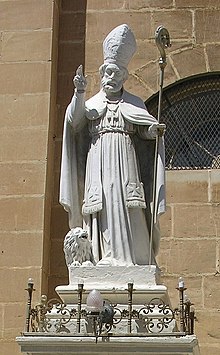Saint Publius
Publius | |
|---|---|
 | |
| Bishop of Athens Bishop of Malta | |
| Died | c. 112;[note 1]or c. 125;[2]or c. 161–180[3] Athens,[4]Achaea,Roman Empire |
| Venerated in | Roman Catholic Church Orthodox Church |
| Feast | 22 January[5](Roman Catholic) 13 March[3](Eastern Orthodox) |
| Attributes | Shown with a lion next to him |
| Patronage | Floriana, Malta |
Saint Publius(Maltese:San Publju;Greek:Πούπλιος) was a first-centuryMalteseChristianprelate.He is considered the firstBishop of Maltaand one of the firstBishops of Athens.
Publius isMalta's firstcanonisedsaint,who is described in theBook of Actsas the 'chief' or prince of the island (Maltese:il-prinċep tal-gżira). According to MalteseChristian tradition,Publius' conversion led toMaltabeing the firstChristiannation in theWest.
His feast day is celebrated by theCatholic Churchand theOrthodox Church,in which the traditions are related but the day of celebration differs.
History and tradition[edit]
According toChristian tradition,it was Publius who receivedPaul the Apostleduring hisshipwreckon the island as recounted in theActs of the Apostles.According to the Acts of the Apostles, Paul cured Publius'dysentery-afflicted father.
- "In the vicinity of that place were lands belonging to a man named Publius, the chief of the island. He welcomed us and received us cordially as his guests for three days. It so happened that the father of Publius was sick with a fever and dysentery. Paul visited him and, after praying, laid his hands on him and healed him. After this had taken place, the rest of the sick on the island came to Paul and were cured. They paid us great honor and when we eventually set sail they brought us the provisions we needed."— Acts 28:7–10, New American Bible
Apart from beingpatron saintofFloriana,Publius is also one of the two patron saints of Malta beside Paul. He was martyred c. 125,[2]during the persecution of EmperorHadrian.
His feast is celebrated on 22 January in theRoman Catholic Church,which places him as the successor ofDionysius the Areopagite,dating his martyrdom to c. 112.[note 2]
In theEastern Orthodox Church,however, his feast day is observed on13 March,and according to an epistle ofDionysius, Bishop of Corinth,he is placed as the successor ofNarcissus of Athens,dating his martyrdom to the period of thepersecution under Marcus Aurelius(r. 161–180).[3]
See also[edit]
Notes[edit]
- ^"+ c 112. Tradition identifies this saint with Publius, 'chief man of the island of Malta', who befriended St Paul after his shipwreck (Acts 28:7). He became the first Bishop of Malta and laterBishop of Athens,being martyred under Trajan. "[1]
- ^"At Athens, the birthday of St. Publius, bishop, who, as successor of St.Denis the Areopagite,nobly governed the Church of Athens. No less celebrated for the lustre of his virtues than for the brilliancy of his learning, he was gloriously crowned for having borne testimony to Christ. "[5]
References[edit]
- ^Publius 21 Jan.Latin Saints of the Orthodox Patriarchate of Rome.
- ^ab"Publius of Malta".Catholic Online.RetrievedApril 22,2011.
- ^abcGreat Synaxaristes(in Greek):Ὁ Ἅγιος Πούπλιος ὁ Ἱερομάρτυρας Ἐπίσκοπος Ἀθηνῶν.13 Μαρτίου. ΜΕΓΑΣ ΣΥΝΑΞΑΡΙΣΤΗΣ.
- ^Fr. Andrew Anglorus.Orthodox Europe: Orthodox Malta.St John's Orthodox Church, Colchester. Retrieved: 2013-02-07.
- ^abThe Roman Martyrology.Transl. by the Archbishop of Baltimore. Last Edition, According to the Copy Printed at Rome in 1914. Revised Edition, with the Imprimatur of His Eminence Cardinal Gibbons. Baltimore: John Murphy Company, 1916. p. 21.
